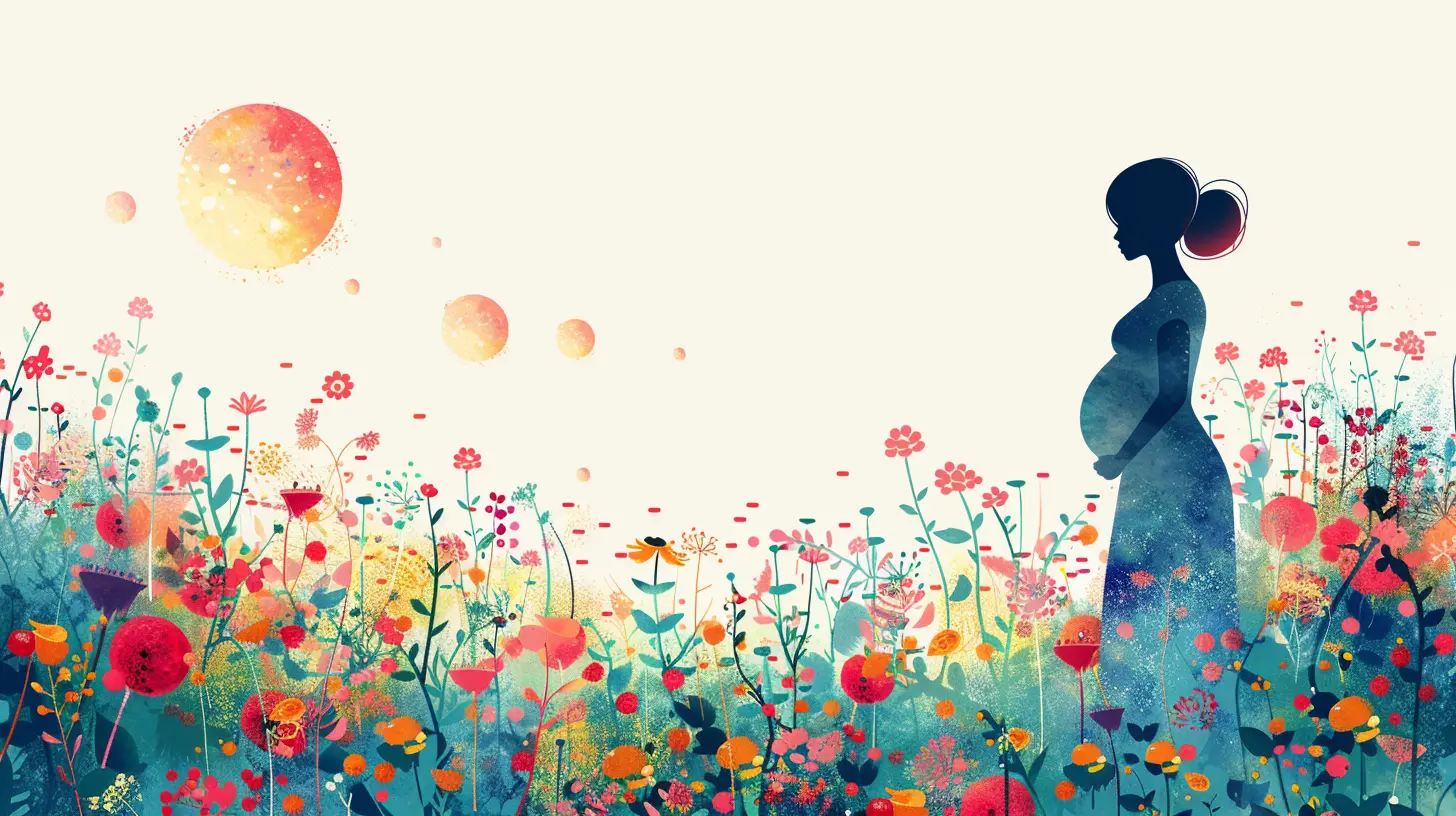Hormonal Changes During Pregnancy: What to Expect
25 December 2024
Pregnancy is nothing short of a miraculous journey. From the moment you see those two pink lines on a pregnancy test, your body begins a whirlwind of changes, most of which are driven by hormones. But let's be real—growing a tiny human inside you is no small feat! Hormones act as the little managers orchestrating everything from your physical changes to your mood swings. Don’t worry though, this is all part of the plan to help your baby grow and prepare your body for labor. Want to know what’s happening behind the scenes? Let’s dive into the fascinating world of hormonal changes during pregnancy and figure out what to expect!
What Are Pregnancy Hormones, Anyway?
Think of hormones as little chemical messengers that tell your body what to do and when to do it. During pregnancy, these hormones go into overdrive, ensuring everything is set up for your baby’s growth and your wellbeing. While some hormones are familiar players like estrogen and progesterone, others, like human chorionic gonadotropin (hCG) or relaxin, are unique to this stage.Each of these hormones has a role in the grand production that is pregnancy. And oh boy, do they love multitasking—while some make you glow, others may test your patience with mood swings, nausea, and even a little forgetfulness (hello, baby brain!). 
Key Hormones and Their Roles in Pregnancy
Let’s break it down. Your body produces tons of hormones during pregnancy, but here are the key players and what they’re up to.1. Human Chorionic Gonadotropin (hCG)
- What It Does: Often dubbed the "pregnancy hormone," hCG is what gives you that positive test result. Produced by the placenta, it helps maintain early pregnancy and supports the production of other hormones like estrogen and progesterone.- What You Might Feel: Nausea and morning sickness. Yep, you can blame hCG for those queasy mornings!
2. Progesterone
- What It Does: Progesterone is like the ultimate project manager. It helps prepare your uterus for pregnancy, prevents premature contractions, and supports your baby’s development.- What You Might Feel: Fatigue, bloating, and sometimes a heightened sense of smell. (And yes, it’s why some foods suddenly smell like they’ve been made by Lucifer himself.)
3. Estrogen
- What It Does: This multitasker promotes the development of your baby’s organs, the growth of your milk ducts, and even your placenta.- What You Might Feel: Estrogen also boosts blood flow, which gives you that famous "pregnancy glow." On the flip side, it’s also behind mood swings and skin changes like melasma (those little dark patches that randomly appear).
4. Relaxin
- What It Does: As the name suggests, relaxin loosens up your ligaments and joints to make space for your growing baby and prepare your pelvis for childbirth.- What You Might Feel: Back pain or that weird loose-joint sensation. Think of it as your body getting limber for the big day!
5. Oxytocin
- What It Does: Known as the "love hormone," oxytocin plays a big role in labor and bonding. It stimulates contractions when the time comes and helps you bond with baby during breastfeeding.- What You Might Feel: Not much in the earlier stages, but during labor, you’ll definitely feel its power!
6. Prolactin
- What It Does: Prolactin preps your body for breastfeeding by stimulating milk production.- What You Might Feel: Tenderness or fullness in your breasts as your body gears up for milk-making.

The Effects of Hormonal Changes on Your Body and Mind
Let’s be honest—pregnancy hormones can feel like they’re waging a war inside your body. But each symptom has a purpose, and understanding the “why” behind these changes can make them a little easier to handle.1. Mood Swings
Ever cried over a commercial or been irrationally mad because your favorite ice cream flavor wasn’t in stock? Yep, hormones like estrogen and progesterone are behind your emotional rollercoaster. They can fluctuate quickly, making you feel all the feels—sometimes all in one afternoon!2. Morning Sickness
That dreaded queasiness, mostly in your first trimester, is your body’s way of keeping you and your baby safe from potentially harmful foods. (Even if it feels like your body’s playing a cruel joke when broccoli suddenly smells worse than a skunk!)3. Skin Changes
Pregnancy can make you glow—or gift you acne. Increased estrogen boosts oil production and blood flow, which can brighten your complexion. But hormonal changes can also lead to breakouts or melasma (pregnancy mask).4. Energy Levels
Feeling like you could sleep for a hundred years? That’s progesterone at work, pushing you to take it easy and get the rest you’ll need later.5. Digestive Changes
From heartburn to constipation, your digestive system slows down as progesterone relaxes your muscles. This helps absorb nutrients for your baby but can leave you feeling uncomfortable.
Don’t Forget the Third Trimester Hormones
As you reach the home stretch, your hormones go into full prep mode for delivery and postpartum life. Here’s what you can expect:- Nesting Instinct: Ever felt like deep-cleaning your entire house at 3 a.m.? This might be linked to peaks in oxytocin and adrenaline toward the end of pregnancy.
- Braxton Hicks Contractions: These "practice contractions" get your body ready for labor, and they’re likely linked to surges in oxytocin.
- Colostrum Production: Your first "liquid gold" milk kicks in thanks to prolactin.
How to Manage Hormonal Symptoms
Navigating these changes doesn’t have to feel overwhelming. Here are some tips to help you stay comfortable through the hormonal storm:1. Stay Active: Light exercise can regulate your mood and combat fatigue. Yoga or walking works wonders!
2. Eat a Balanced Diet: Foods rich in fiber, protein, and healthy fats can help manage energy dips and digestive discomfort.
3. Stay Hydrated: Water helps ease bloating and keeps your skin glowing.
4. Rest Up: Listen to your body, and don’t feel guilty about taking naps—it’s your hormones’ way of saying you need it.
5. Talk It Out: If mood swings take a toll, open up to your partner or a trusted friend. Seriously, a good venting session can work wonders!
When to Call Your Doctor About Hormonal Changes
While most symptoms are a normal part of pregnancy, some signs may need a professional’s attention, like:- Severe or sudden swelling (this could be a sign of preeclampsia).
- Persistent nausea or throwing up beyond the first trimester.
- Extreme mood changes lasting more than a few weeks (this could indicate prenatal depression).
Remember, your doctor is your go-to for anything that feels "off." Don’t hesitate to reach out—they’ve seen it all!
Postpartum Hormones: What Comes Next?
After delivery, those hormones that supported your pregnancy will start winding down—enter postpartum hormones. This phase can bring on the infamous "baby blues" or (in some cases) postpartum depression. But don’t worry, with time and support, your body will figure out its new normal.Final Thoughts
Pregnancy hormones are like your body’s backstage crew, working tirelessly to support the star of the show—you and your growing baby. Sure, they might throw a few curveballs along the way, but every symptom has a purpose. Whether it’s prepping your body for labor or ensuring your baby gets what they need to grow, these little messengers have your back.So, the next time you feel like crying over spilled milk or can’t understand why pickles suddenly taste like heaven, remind yourself that it’s just your hormones doing their job. And hey, growing a human is no small task—you’re rocking it, mama!
all images in this post were generated using AI tools
Category:
Healthy HormonesAuthor:

Madeline Howard
Discussion
rate this article
11 comments
Caelestis Myers
Embrace the journey—your body’s strength during pregnancy is remarkable!
April 6, 2025 at 4:21 AM

Madeline Howard
Thank you! Embracing this journey truly highlights the incredible resilience and strength of our bodies.
Christa McLoughlin
Pregnancy is a beautiful journey, but those hormonal changes can feel like a wild rollercoaster! Just remember, it’s all part of the adventure—embrace the ups and downs!
March 31, 2025 at 2:59 AM

Madeline Howard
Absolutely! Embracing the emotional and physical shifts is key to navigating this incredible journey. Thank you for sharing your thoughts!
Lillian Rogers
Great overview! Understanding hormonal changes during pregnancy is essential for expectant mothers to navigate the journey with confidence.
February 3, 2025 at 3:38 AM

Madeline Howard
Thank you! I'm glad you found it helpful—understanding these changes is indeed crucial for a smooth pregnancy journey.
Nellie McMillan
Embrace the shifts; they're nature's powerful gift to motherhood.
January 26, 2025 at 4:19 AM

Madeline Howard
Thank you! Embracing these shifts helps us appreciate the transformative journey of motherhood.
Mika Mahoney
This article effectively outlines the complex hormonal shifts during pregnancy, highlighting their impact on both physical and emotional health. Understanding these changes is crucial for expectant mothers, fostering well-being and preparedness for the transformative journey ahead.
January 20, 2025 at 5:28 PM

Madeline Howard
Thank you for your insightful comment! I'm glad you found the article helpful in understanding the crucial hormonal changes during pregnancy.
Rook Mendoza
Essential insights for expectant mothers!
January 11, 2025 at 5:36 AM

Madeline Howard
Thank you! I'm glad you found the insights helpful. Wishing all expectant mothers a smooth journey!
Ezra Spencer
Expect highs, lows—hormones on a rollercoaster!
January 7, 2025 at 4:09 PM

Madeline Howard
Absolutely! Hormonal fluctuations can lead to a wild emotional ride during pregnancy. Thanks for highlighting that!
Lara Stone
Understanding hormonal changes during pregnancy is essential for both emotional and physical well-being. Embrace this transformative journey, and remember that each fluctuation plays a vital role in nurturing both you and your developing baby.
December 31, 2024 at 4:22 PM

Madeline Howard
Thank you for highlighting the importance of understanding these hormonal changes! They truly are crucial for both the mother's and baby's well-being during this transformative journey.
Reina Spencer
Great article! Pregnancy can feel like a rollercoaster of emotions and physical changes. Understanding the hormonal shifts really helps in navigating this beautiful yet challenging journey. Thanks for breaking it down so clearly—it makes me feel more prepared for what's ahead!
December 30, 2024 at 5:38 AM

Madeline Howard
Thank you for your kind words! I’m glad you found the article helpful. Wishing you all the best on your pregnancy journey!
Fallon Estes
Pregnancy hormones are powerful; embrace the chaos and trust your body's incredible journey!
December 29, 2024 at 5:36 PM

Madeline Howard
Thank you! Embracing the journey is key, as our bodies navigate these transformative changes.
Chase Montgomery
Understanding hormonal changes during pregnancy is essential for expecting mothers. Awareness fosters resilience, helping navigate emotional and physical shifts with grace and support.
December 29, 2024 at 3:30 AM

Madeline Howard
Thank you for your insightful comment! Awareness of hormonal changes truly empowers expectant mothers in navigating their journey with confidence and support.
MORE POSTS

Understanding the Glycemic Index and Its Impact on Diabetes

How to Make a Smoothie That Supports Healthy Hormones

How to Eat for Performance During a Sports Competition

Boost Your Metabolism with These At-Home Fat-Blasting Workouts

Recognizing and Managing Hypoglycemia

Heart-Healthy Habits to Complement Your Cardio Routine

Signs Your Child Might Need a Gluten-Free Diet

Home Workouts to Improve Your Flexibility and Balance